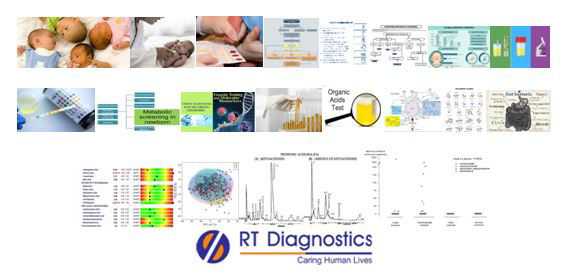Urine – Organic Acid:
Why Urine – Organic Acid Test ?
CLINICAL INFORMATION
Organic acids are a broad class of compounds formed during fundamental metabolic process in the body. Dietary intake of food consists of many nutritive substances such as carbohydrates, fats, proteins, vitamins and minerals in different mixed ratios. When food gets assimilated these complex food is processed into simple basic units called organic acids and thus gets absorbed by the small intestine. These resulting organic acids are used by the body to generate cellular energy and also provides many building blocks required for the cell function. Any excess accumulation of organic acids in urine indicates a metabolic inhibition or block. One of the most important uses of the organic acid tests (formerly known as metabolic analysis profile) is an indicator of dysbiosis (abnormal overgrowth of microbial flora in the intestinal flora). It may occur due to various causes such as malnutrition, inherited enzyme deficiency (hereditary), toxic build-up, drug effect etcand as a consequence of these excessive micro-flora in the gut, the metabolites formed (accumulated organic acids can signal metabolic inhibition or block) by them might enter the systemic circulation and may influence or alter human metabolisms eg. excessive dopamine (neurotransmitter) etc. Thus test result helps in functional and nutritional evaluation that assesses important metabolic pathways, which helps the physician to identify the root cause of dysfunction in any suspected patient. Elevations in organic acids can reflect functional need for nutrients at biochemical level for normal cellular function. These patients are usually associated with mood disorders, mitochondrial dysfunction, fatigue, chronic stress, inflammation etc. Uncharacteristic high levels of these organic acids may be reflected in several diseases such as anxiety, depression, cardiovascular diseases, neurocognitive decline, anorexia, cancer, diabetes etc. This metabolic analysis profile requires certain prerequisites for its analysis such as mal-absorption and dysbiosis markers, cellular energy and mitochondrial markers, vitamin markers, neurotransmitter metabolites, toxin and detoxification markers, oxalate markers etc.
Hence urine organic acid test is performed in a first-morning void urine sample specimen that helps to detect organic acidemias, thus ruling out for differential diagnosis, which helps to detect nutritional or certain infectious or bacterial overgrowth. This test also aids in differing a suspected patient from inborn errors (due to enzyme defects. absence of enzyme or lack of enzyme’s functional activity) of metabolism. The application of urinary organic acid assessment plays a significant role in neonatal and/or pediatric medicine to identify genetic inborn errors of metabolism and their severity, which depend on the degree and the type of error. Therefore urine organic acid test does a complete evaluation of key biomarkers of metabolism. This analytical methodology requires alkaline picrate, GCMS, liquid chromatography – Tendem Mass Spectroscopy - LC/MS/MS etc. Additional tests include NutrEval FMV, NutrEval Plasma profile, Metabolomics test etc. Other tests include spectrometry studies - mass spectrometry, gas chromatography-mass spectrometry, HPLC, Tandem mass spectrometry, ferric chloride test, ninhydrin test, Guthrie test, plasma acylcarnitine test, tissue biopsy, DNA testing, karyotyping, 24 hours PBG test, tests for uroporphyrin and coproporphyrin, enzyme tests (porphyrin pathway of heme metabolism) to detect enzyme deficiency, nerve conduction test for neuropathy, ultrasound of liver for hepatocellular carcinoma, LFT, blood sodium levels (for hyponatremia), enzyme assays, molecular analysis(as a support and to rule out for another differential diagnosis), PCR, ELISA, blotting techniques etc.

General Instructions:
Sample Requirement: Specimen - Urine Sample. Test Preparation: None.
NOTE - Sample for specimen collections may vary based on the patient’s condition/cases according to the patient’s presenting complaints/signs or symptoms:
SPECIMEN REQUIREMENT (Special or Rare Cases) - As instructed and guided by Physician / Clinician / Pathologist / as per Laboratory’s requirements, according to procedures and protocols.
This Multi-Specialty Clinical Referral Laboratory RT DIAGNOSTICS provides precise and accurate tests with an extensive range of testing services to the medical centres to help in the diagnosis and identification of pathology in the test specimens for infectious diseases and also to evaluate the function of organ systems of the patient. It prevents further complications and helps to stabilize and restore health to near normalcy at the earliest without delay.



